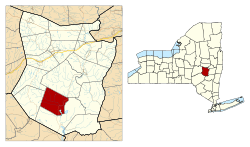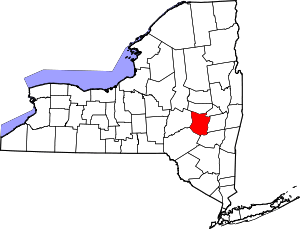Blenheim, New York
| Blenheim, New York | |
|---|---|
| Town | |
 Location in Schoharie County and the state of New York. | |
| Coordinates: 42°29′11″N 74°29′56″W / 42.48639°N 74.49889°WCoordinates: 42°29′11″N 74°29′56″W / 42.48639°N 74.49889°W | |
| Country | United States |
| State | New York |
| County | Schoharie |
| Area | |
| • Total | 34.4 sq mi (89.0 km2) |
| • Land | 33.9 sq mi (87.9 km2) |
| • Water | 0.4 sq mi (1.1 km2) |
| Elevation | 1,545 ft (471 m) |
| Population (2000) | |
| • Total | 330 |
| • Density | 9.7/sq mi (3.8/km2) |
| Time zone | Eastern (EST) (UTC-5) |
| • Summer (DST) | EDT (UTC-4) |
| FIPS code | 36-06893 |
| GNIS feature ID | 0978738 |
Blenheim is a town in Schoharie County, New York, United States. The population was 377 at the 2010 census. The town was named after a land patent, which itself was named after the Battle of Blenheim.
The Town of Blenheim is in the southwest part of the county and is east of Oneonta, New York.
History
The town was the site of raids and skirmishes during the American Revolution.
The town was one of the original six towns of the county, created in 1797 from Schoharie. In 1803, part of Blenheim was used to create the Town of Jefferson. Another part of Blenheim was taken in 1848 to form part of the new Town of Gilboa.
The town had one of the world's longest wooden single-span covered bridges (at 232 feet), the Old Blenheim Bridge. It was built in 1855 and existed until 2011, when it was destroyed by flooding caused by Tropical Storm Irene.[1]
The Lansing Manor House and North Blenheim Historic District are listed on the National Register of Historic Places.[2]
Past residents of note
- John A. King, former governor of New York
- Alonzo A. Loper, Wisconsin state legislator
- E. Woolsey Peck, Chief Justice of the Alabama Supreme Court
Geography
According to the United States Census Bureau, the town has a total area of 34.4 square miles (89 km2), of which, 33.9 square miles (88 km2) of it is land and 0.4 square miles (1.0 km2) of it (1.25%) is water.
The Schoharie Creek flows through the town.
New York State Route 30 is a north-south highway in the eastern part of Blenheim
Demographics
| Historical population | |||
|---|---|---|---|
| Census | Pop. | %± | |
| 1820 | 1,826 | — | |
| 1830 | 2,280 | 24.9% | |
| 1840 | 2,725 | 19.5% | |
| 1850 | 1,314 | −51.8% | |
| 1860 | 1,367 | 4.0% | |
| 1870 | 1,437 | 5.1% | |
| 1880 | 1,191 | −17.1% | |
| 1890 | 951 | −20.2% | |
| 1900 | 768 | −19.2% | |
| 1910 | 616 | −19.8% | |
| 1920 | 516 | −16.2% | |
| 1930 | 397 | −23.1% | |
| 1940 | 415 | 4.5% | |
| 1950 | 378 | −8.9% | |
| 1960 | 345 | −8.7% | |
| 1970 | 260 | −24.6% | |
| 1980 | 292 | 12.3% | |
| 1990 | 332 | 13.7% | |
| 2000 | 330 | −0.6% | |
| 2010 | 377 | 14.2% | |
| Est. 2014 | 371 | [3] | −1.6% |
As of the census[5] of 2000, there were 330 people, 150 households, and 97 families residing in the town. The population density was 9.7 people per square mile (3.8/km²). There were 303 housing units at an average density of 8.9 per square mile (3.4/km²). The racial makeup of the town was 96.97% White, 1.52% African American, 0.30% from other races, and 1.21% from two or more races. Hispanic or Latino of any race were 2.12% of the population.
There were 150 households out of which 24.7% had children under the age of 18 living with them, 50.7% were married couples living together, 7.3% had a female householder with no husband present, and 34.7% were non-families. 28.7% of all households were made up of individuals and 18.0% had someone living alone who was 65 years of age or older. The average household size was 2.20 and the average family size was 2.64.
In the town the population was spread out with 18.8% under the age of 18, 4.2% from 18 to 24, 24.2% from 25 to 44, 33.3% from 45 to 64, and 19.4% who were 65 years of age or older. The median age was 48 years. For every 100 females there were 100.0 males. For every 100 females age 18 and over, there were 94.2 males.
The median income for a household in the town was $38,500, and the median income for a family was $44,821. Males had a median income of $32,321 versus $24,167 for females. The per capita income for the town was $20,993. About 5.9% of families and 8.5% of the population were below the poverty line, including 3.8% of those under age 18 and 14.5% of those age 65 or over.
Communities and locations in Blenheim
- Cole Hollow – A valley near the north town line.
- Eminence – A hamlet on the northwest town line.
- Mine Kill State Park – A state park in the southeast part of the town.
- North Blenheim – A hamlet in the eastern part of the town on NY-30.
- Ruth – A hamlet in the southwest part of the town on County Road 12.
Politics
Shawn J. Smith, Esq. (D) is the elected Supervisor of Blenheim, he also operates his law office out of the Chapman Hotel located in the Town of Blenheim. Smith was elected on November 5, 2013 in a close election against 20-year incumbent Bob Mann, Jr.
At the Democratic Caucus on September 10, 2015, the incumbent supervisor Shawn J. Smith was challenged by lifelong politician and former Secretary of State Gail Shaffer. The meeting was one of the largest caucuses ever held in the Town of Blenheim. Smith won overwhelmingly with nearly 70 percent of the votes cast. After the loss, Shaffer (a liberal Democrat) changed parties to run as a Republican and will face Smith at the General Election on November 3, 2015.
References
- ↑ http://www.nytimes.com/2011/09/01/us/01bridges.html
- ↑ National Park Service (2009-03-13). "National Register Information System". National Register of Historic Places. National Park Service.
- ↑ "Annual Estimates of the Resident Population for Incorporated Places: April 1, 2010 to July 1, 2014". Retrieved June 4, 2015.
- ↑ "Census of Population and Housing". Census.gov. Archived from the original on May 11, 2015. Retrieved June 4, 2015.
- ↑ "American FactFinder". United States Census Bureau. Archived from the original on 2013-09-11. Retrieved 2008-01-31.
External links
- Official Blenheim site
- County, Blenheim Information
- Town of Blenheim, NY
- Early history of Blenheim, NY
- Waterfalls of Blenheim, NY
